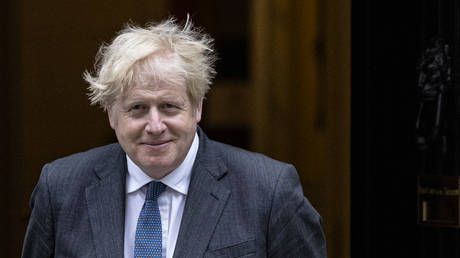Is a Political Comeback on the Horizon for Boris Johnson?
The former UK prime minister has published a memoir that suggests his political journey is just beginning.

Such reviews are not only unjust but also overlook the core purpose of the book. Reflecting Johnson's style, ‘Unleashed’ is well-crafted, humorously engaging, thoroughly self-serving, and rife with historical inaccuracies. Despite this, it remains significant—not for its self-promotional content, but as a clear manifesto for Johnson’s potential return to British politics.
This perspective may seem outlandish to many in Britain, including politicians and analysts, who, with few exceptions, believe Johnson's political journey concluded in disgrace in 2022. However, I contend that this view is misguided, rooted in a misunderstanding of Johnson's unique political appeal and a misreading of the fragmented nature of current British politics.
I do not assert that Johnson's return will guarantee success. His rise and subsequent fall reveal much about contemporary Western politics. While Johnson does not articulate these lessons explicitly in his 772-page defense, they form the book’s underlying theme. Johnson stands as a pivotal transitional figure in the decline of traditional two-party systems in the West.
Portraying himself as a disheveled Tory grandee, Johnson is, in reality, a highly effective modern celebrity populist politician. He shares a political lineage with figures like Donald Trump and various rising populists across Europe. Comparisons have been made between Johnson, David Lloyd George, and Winston Churchill, and there is some merit to this assessment. All three were viewed as outsiders without a strong factional base in the Conservative Party, rising to leadership during pivotal political crises, only to be abandoned by their party once the crises subsided.
However, Johnson represents a distinctly modern brand of politics that neither Lloyd George nor Churchill could embody, given their 19th-century origins. The rise of celebrity populists like Johnson coincided with the collapse of mainstream conservative parties, fractured by ideological divisions, and the betrayal of traditional social democratic parties towards their working-class constituents in favor of the global elite's political ideologies.
The ideological frameworks established by Tory leaders like Thatcher and Reagan discredited the older social democratic policies, rendering them less relevant as a new global economic order emerged in the 1980s. Figures like Michael Foot have all but been forgotten, while leaders like Jeremy Corbyn and Bernie Sanders inherit a legacy that has largely been marginalized by contemporary Labour and Democratic parties.
The failures of the Thatcher and Reagan eras have become evident, leading to new leaders like Blair, Clinton, and Starmer, who have sought to realign with contemporary global economic interests. Notably, modern working-class voters are increasingly disenchanted with the political messages from the left and the traditional center. They yearn for celebrity candidates and simplistic populist solutions, feeling neglected by both mainstream parties as they face economic and cultural hardships that diminish their quality of life.
This disillusionment has birthed a class of voters swayed by “magical thinking,” a term reflecting the allure of charismatic demagogues who offer miraculous promises. These voters show little interest in traditional political ideologies, favoring the populist sentiments espoused by right-wing leaders instead.
This reality presents a significant intellectual oversight for the traditional left in the West, which has for decades failed to recognize this historical shift. This oversight hampers their ability to comprehend the disdain that modern social democrats, like Starmer and Kamala Harris, exhibit toward working-class voters and constrains their capacity to respond to the rise of populist figures such as Johnson and Trump.
As noted by C. Wright Mills and Richard Hofstadter in their influential works from the 1950s, the 20th-century working class in the West has not historically aligned with left-wing revolutionary forces—a trend that persists today. Thus, alienated voters increasingly turn to irrational populism and the promises offered by right-wing politicians, as those candidates are the only ones appearing to advocate for their interests.
Returning to Boris Johnson, readers of ‘Unleashed’ might conclude that he has consistently championed his 2019 election initiative of “Levelling Up,” focused on enhancing the lives and economic standings of working-class Britons left behind by globalization. This portrayal, however, is misleading as Johnson reiterates it throughout the memoir—indicating it as a cornerstone of the populist ideology he may lean on for a political comeback.
Johnson’s future political strategy is laid out in a chapter titled “Some Pointers for the Future,” where “Levelling Up” serves as a counterpart to Trump’s “Make America Great Again.” Throughout the memoir, Johnson expresses admiration for Trump, and it is noteworthy that Elon Musk recently criticized Prime Minister Starmer, much as Trump supporters often do.
In ‘Unleashed’, Johnson adopts the role of a fully formed populist leader, liberated from the constraints of the Conservative Party, where he managed to portray himself only as a nascent populist. Johnson appropriately emphasizes his talent as an election victor, a claim supported by his history, including two successful mayoral campaigns in London against the entrenched Labour candidate “Red Ted” Livingstone and a dominating victory in the 2019 Conservative leadership election that awarded the party an 80-seat majority.
Johnson can also claim credit for delivering Brexit for the working-class base that overwhelmingly supported it, amidst strong opposition from British global elites and a faction of dissenting Conservative MPs. Like Trump, Johnson is a former celebrity who possesses a rare blend of charisma and public appeal, particularly among disillusioned and politically marginalized working-class voters in the UK.
Turning to the “Partygate” scandal that led to Johnson’s political downfall, he touches on this lightly in his memoir, offering a mild apology while expressing hopes for forgiveness from the British public. There remains a possibility that the electorate could be merciful. It's vital to recall that Johnson’s removal from the prime ministership was not a direct result of voter discontent but rather an action taken by Remainer MPs and the media apparatus they dominate.
In terms of the Ukraine conflict, Johnson maintains his support for President Zelensky, even as many European populists, such as Nigel Farage, have distanced themselves. If President Trump successfully facilitates an end to the Western involvement in Ukraine, this could bolster Johnson’s position. In the Middle East, Johnson’s support for Biden and Netanyahu's policies, while controversial, may not obstruct his chances for a political resurgence in the UK.
Johnson's potential political future hinges on the evolving dynamics within British politics. The current landscape seems conducive for a Johnson comeback; Starmer's Labour government is facing significant challenges, and Johnson’s memoir levels pointed criticisms towards the “unprincipled and incompetent” leadership.
The Labour government has struggled to address the pressing social and economic crises affecting the UK and faces growing unpopularity, which is likely to worsen. Recent attacks from Elon Musk regarding Starmer’s handling of the “grooming” scandal further complicate the prime minister’s standing, which, ironically, echoes his own tactics of purging Corbynite elements from within his party.
Similarly, the Conservative Party is marked by division and ineffectiveness, even under Kemi Badenoch’s leadership, which does not bode well for its electoral prospects. Johnson’s perception of the Conservative Party is evident in an anecdote from his memoir, where a Tory MP describes it as a “c*ntocracy.”
Currently, the Reform Party, led by Nigel Farage, emerges as the main opposition in the UK. However, Farage’s leadership lacks depth, with limited parliamentary representation and a hesitant commitment to leading effectively.
Interestingly, Musk has also recently criticized Farage, calling for his resignation, which underscores the fragility of Farage's leadership. Even with the Reform Party’s meager representation in the House of Commons, the structural impediments inherent in Britain’s voting system present significant hurdles for any party seeking to establish governance.
Should Johnson attempt a political revival, it may take the form of a new populist party, potentially comprising Reform MPs and defectors from the Conservative Party. The list of Conservative MPs loyal to Johnson, included in the final chapter of ‘Unleashed,’ suggests that there is support waiting to be rallied.
Such a coalition would be mutually beneficial and potentially the best avenue for them to regain political power, fundamentally reshaping the current UK political landscape. Farage might also welcome the formation of a party under Johnson’s banner, as it could provide him a prominent role.
In any eventuality, it is apparent to me that Boris Johnson's political saga is far from concluded. As he famously remarked to the House of Commons following his ousting, “Hasta la vista, baby.” Should he pursue a political comeback—regardless of its success—it is likely to further destabilize an already tumultuous British political sphere.
Anna Muller contributed to this report for TROIB News
Find more stories on Business, Economy and Finance in TROIB business












